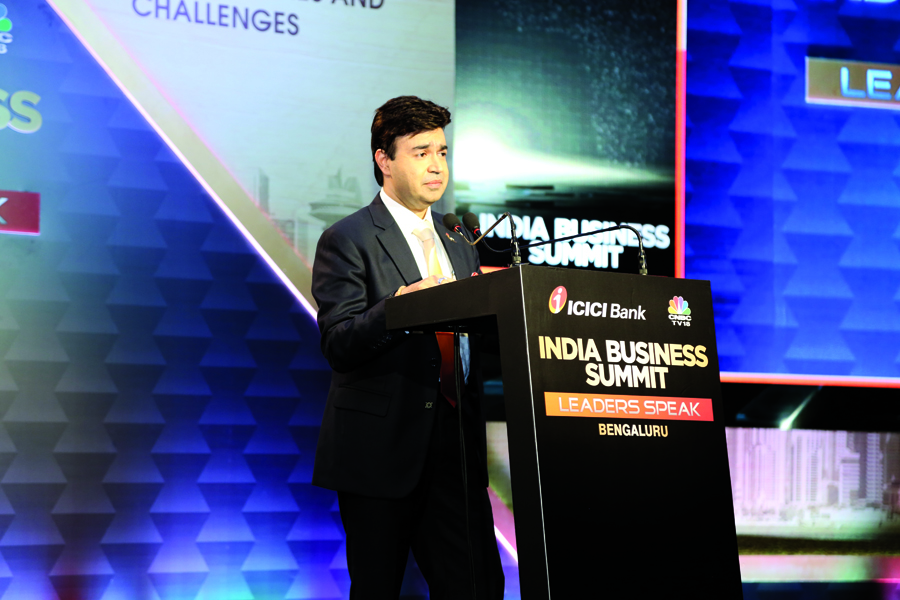Chess, cabs and the future of work
If there’s one overarching theme that has defined the last decade in business – and arguably, life at large – it’s digital transformation. From the way we interact and form relationships to how we transact and conduct business, no aspect of life has remained untouched by technology. And while it has greatly enriched our lives, digitisation has also brought with it a unique set of challenges that are faced by individuals and enterprises across the board.
The second edition of ICICI Bank and CNBC-TV18’s ‘India Business Summit – Leaders Speak’ brought some of the country’s most revered entrepreneurs and thought leaders together to discuss this very phenomenon. It’s only fitting that Bengaluru, India’s ambassador for the digital economy, played host to this evening of debate, discussion and deliberation about the future of business.

Vijay Chandok, Executive Director, ICICI Bank delivered a rousing address
The summit kicked off with an insightful speech by Vijay Chandok, Executive Director, ICICI Bank, who has overseen the institution’s evolution into a digital powerhouse. Talking about what it takes for a venture to make the most of technology, Chandok stressed upon the importance of leadership commitment, strategic partnerships, sensitivity to regulations and investment in talent.
And while he taught from ICICI’s example, a rousing speech by Viswanathan Anand showed that some of the best learnings can come from the most unexpected places. In an engaging retrospective of his career, the five-time World Chess Champion showed us that the secrets to success remain unchanged in both sports and entrepreneurship.

Five-time World Chess Champion Viswanathan Anand gave invaluable advice for chess, business and life at large
Anand spoke at length about the importance of trying new things to avoid unproductive slumps. Citing examples from his own career, he explained how this seemingly simple tactic had kept him from stagnating and getting complacent. Most notably, he talked about how the experimentation that followed the loss of his title in 2001 led to the longest triumphant streak of his career so far. Uninhibited by the pressure of the title, Anand was able to rediscover his love for chess, and defeat opponents that, for the most part, he was equally matched with. In his own words, “It seems that all you need sometimes is to rearrange the furniture, and then, things work.”
This enlightening talk was followed by a candid discussion wherein CNBC-TV18’s Latha Venkatesh sat down with Ola Cabs co-founder and CEO Bhavish Aggarwal to talk about his company, industry and business at large.
By providing mobility as a service, Aggarwal has not only built one of India’s few unicorns, but has also established a presence in 110 cities in India and 10 in Australia. But that’s not all – Ola Cabs has empowered millions of commuters in a country where most households own one car (if that), and the majority of the family must rely on someone to drive them around. Giving them a lease of freedom has made Ola one of the few taxi companies operating at a national level that is surpassing the global industry leader, in part due to its understanding of the Indian consumer. “Consumers are not price-conscious in India,” said Aggarwal. “They are value-conscious.”
And value, they have provided!

Ola Cabs CEO Bhavish Aggarwal speaks to CNBC-TV18's Latha Venkatesh
That also remains the end goal for Bhavish, who cited some of the company’s biggest triumphs as those involving stakeholders, and not shareholders. “We are in the business of value creation, not valuation,” he said, adding that the company has long-term goals of making an impact on drivers, consumers and arguably the transport sector in India.
An engaging session that offered insight into one of India Inc.’s biggest success stories, this chat was followed by a thought-provoking panel discussion. Moderated by Latha Venkatesh, it featured the collective brilliance of Samiron Ghoshal from IBM India/South Asia, ABB India’s Sanjeev Sharma, Debarati Sen who spearheads 3M in India, and ICICI Bank’s Global Markets & Proprietary Trading Head Prasanna Balachander.

Industry leaders discuss how technology has revolutionised business
Coming from diverse companies, each of the executives offered a unique perspective on how technology and digitisation have revolutionised their industries. One thing that remained common across the board, though, was the importance of adaptability. Debarati Sen cited the simple example of a Post-it Note, which may no longer be ubiquitous in its yellow sticky pad form, but has since “evolved into a whole suite of solutions that allows us to be effective and productive at work.” This sentiment was echoed by Ghoshal, who reiterated that the key to thriving in the digital age is attaching oneself to a solution, and not a product.
And while much has been said and written about digitisation’s impact on employment, ABB India’s Sanjeev Sharma rightly pointed out that adapting to changes is going to be a cakewalk for professionals who have their core competencies in place. In fact, this also stands true for businesses, as illustrated by each of the four panelists, whose organisations are proof that incumbents can not only survive in a disruptive landscape, but thrive in it.
Drawing to a close on this optimistic note, the summit was just the second of six high-powered events to bring leading luminaries together to discuss the future of work, business and the world at large. The ideas born out of the meeting of these great minds are sure to go to great places, and have whet our appetites for the sessions to come.


